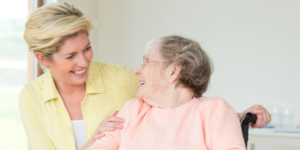
In fact, 40% of caregivers today are men, according to Caregiving in the U.S., a 2020 joint publication of AARP and the National Alliance for Caregiving (NAC). Findings also indicate that nearly half of all caregivers are 18 to 49 years old; only 34% are 65 or older.
Yet despite differences in ages, gender, and ethnicities, caregivers share many of the same concerns.
Stressed Out and Lonely
Not surprisingly, the AARP/NAC survey discovered that feelings of stress, anxiety, and loneliness are common among caregivers. Unfortunately, feeling lonely only makes a tough situation worse, as loneliness has a negative impact on both physical and mental health. A sobering 72% of respondents reported high emotional stress levels.
Adding to their anxiety, some respondents felt unprepared to handle all the tasks associated with caring for a person with chronic or multiple conditions, blaming a lack of knowledge and/or training. Caring for someone with a memory, emotional, or mental health issue—or dealing with financial strains due to caregiving—only contributes to the problem.
And while most caregivers say they want to take the time to care for themselves, many end up neglecting their physical, emotional, and spiritual health. As a result, those who work more hours per week, assist someone with a more complex condition, or live with the recipient are all more likely to rate their health as “fair” or “poor” compared to non-caregivers.
Signs of Caregiver Burnout
The physical, mental, and emotional demands of caregiving can seem overwhelming, leading to exhaustion and, ultimately, burnout. It can occur when an individual doesn’t get the help they need, or they try to do more than they can—physically or financially. Unfortunately, many caregivers don’t recognize when they have reached this point.
Signs of caregiver burnout are similar to those of depression and stress including:
- Withdrawal from friends, family, and other loved ones
- Loss of interest in activities previously enjoyed
- Feeling blue, irritable, helpless, or hopeless
- Changes in appetite, weight, or both
- Changes in sleep patterns
- Getting sick more often
- Feelings of wanting to hurt yourself or the person for whom you are caring
- Emotional and physical exhaustion
What Caregivers Want and Need
The majority of caregivers surveyed wanted help in multiple areas, from assistance with financial, legal, and other forms…to more training on the specific conditions of the person in their care. Regardless of the topic, however, the one overriding goal was to feel more competent and confident in keeping the person they cared for safe and comfortable at home.
Specifically,
- About 1 in every 8 would like to talk with a health professional about end-of-life planning, making end-of-life care decisions, or choosing the right care setting—home, assisted living, or a nursing home.
- 25% want help figuring out forms, paperwork, and eligibility for services.
- Many want to know more about using technology for care support.
- Others want to learn how to best manage their care recipient’s challenging behaviors.
Nearly half of all caregivers surveyed would also welcome respite care to take a well-earned break from the challenges of providing daily care. Yet only 14 percent report having used such services.
Top Ten Tips for Taking Care of Yourself
If you’re feeling overwhelmed, stressed, lonely, and more, there are simple steps you can take to feel better and avoid burnout. And that’s good for both you and the person you care for!
- Talk to someone you trust. Let others know about your feelings and frustrations. It is too easy to become socially isolated.
- Educate yourself. Learn as much as you can about the illness of the person you care for. The more you know about their condition, the more effective you will be in caring for them. There are many helpful resources available from national disease groups such as the Alzheimer’s Association and American Heart Association to the National Alliance on Mental Illness (NAMI) for mental health issues.
- Set reasonable goals. Realize that you may need help with certain aspects of caregiving from time to time. Your church, local organizations, or specific disease groups may help, including respite services.
- Be realistic. If your loved one has a progressive condition like Alzheimer’s or Parkinson’s, accept that there may come a time when they require nursing or other help at home, or must move from the family home to a long-term care facility.
- Join a caregiver support group. Sharing your feelings and experiences with others in the same situation can make a real difference in helping manage your stress, reduce feelings of isolation, and identify helpful resources.
- Make time for yourself. Even if you feel like you’re too busy caring for someone else, don’t forget about Get in the habit of setting aside time for yourself—even if it’s just an hour or two—to do what brings joy and meaning to your life.
- Maintain or develop healthy lifestyle habits. Eating right, with lots of vegetables and fruit on the menu, and getting regular exercise and the necessary amount of quality sleep can make a big difference. Limit your intake of caffeine or alcohol. Not taking care of yourself can actually make stress, anxiety, and depression worse.
- Stay Socially Connected. It’s one of the best things you can do for yourself! Social connection can lower anxiety and depression, help regulate emotions, and improve the immune system.
- Use respite care services. Give yourself a temporary break from caregiving and let someone else do the heavy lifting for a change. Whether you arrange for your recipient to get a few hours of in-home care from someone else, or to spend a few days in a nursing home, a brief respite from providing daily care can help you recharge.
- Seek professional A therapist, social worker, or clergy member may be able to help with the various issues you may be facing, including stress, depression, and fatigue.
Capital Caring Health Can Help
The fastest growing segment of the population is age 85 and older, meaning that the need for caregiving will only continue to grow and intensify in the future. So improving healthcare for all must include a focus on helping caregivers—individually and as a group.
For more than 40 years, Capital Caring Heath has been dedicated to our patients, caregivers, and the communities we serve. Toward that end, we offer many free resources on our website to support your caregiving role on such topics as taking care of elderly parents, how to talk to your parent’s doctor, and caring for a dementia patient. The site also provides pertinent information on specific conditions including Alzheimer’s, congestive heart failure (CHF) and more. Lastly, you’ll find extensive content and tools to help you and your loved one with advance care planning (ACP), including the forms needed to legally document one’s wishes at the end of life.
And if the person you care for qualifies for Primary Care at Home, advanced illness/palliative care, or hospice care, we have the services and resources you need, right at your fingertips. Among our many offerings are training and education on your loved one’s condition and care, short-term respite care, home help, delivery of medications and medical supplies, and more.
In short, we’re here for you and your loved one whenever you need us. Learn more about what we offer by clicking here, or calling (800) 869-2136 24/7.


 Dr. Cheryl-Lynne McCalla, DO
Dr. Cheryl-Lynne McCalla, DO Kathleen Ramkaran, RN, CCM
Kathleen Ramkaran, RN, CCM Hali Gantumur
Hali Gantumur Yasmin
Yasmin  Jennifer Olsen GNP-BC
Jennifer Olsen GNP-BC Meena Raj, MD,
Meena Raj, MD, 

 Kimberly Grove
Kimberly Grove
 Pat Bishop
Pat Bishop Elizabeth Ariemma
Elizabeth Ariemma Ray Jay Garcia, M.D.
Ray Jay Garcia, M.D.
 Heidi Young
Heidi Young Matt Kestenbaum
Matt Kestenbaum
 Anne Silao-Solomon, M.D.
Anne Silao-Solomon, M.D. Matthew Irwin, M.D., M.S.W.
Matthew Irwin, M.D., M.S.W. Catherine McGrady, RN, MSN, is Vice President, Clinical Programs at Capital Caring Health. In this role she is responsible for the development, implementation, and monitoring of clinical programs in support of high-quality patient-centered care delivery across the continuum of services. Catherine also manages external partnerships including Capital Caring Health’s participation in ACOs and other value-based clinical programs
Catherine McGrady, RN, MSN, is Vice President, Clinical Programs at Capital Caring Health. In this role she is responsible for the development, implementation, and monitoring of clinical programs in support of high-quality patient-centered care delivery across the continuum of services. Catherine also manages external partnerships including Capital Caring Health’s participation in ACOs and other value-based clinical programs Jason Sobel, MD
Jason Sobel, MD Kremena Bikov
Kremena Bikov Stacy Brown
Stacy Brown Jackie Gouline
Jackie Gouline Susan Roberts
Susan Roberts Brenan Nierman
Brenan Nierman Annette Lindsay
Annette Lindsay Shannon Collier
Shannon Collier Carla Thompson
Carla Thompson Gabby True
Gabby True Evan Kirschner
Evan Kirschner Margaret Doherty
Margaret Doherty Henry Fuller
Henry Fuller Jennifer Godwin
Jennifer Godwin Sally Hughes
Sally Hughes LaWanda Middleton
LaWanda Middleton Hope Collazo
Hope Collazo Odessa Simpson
Odessa Simpson Anne Young
Anne Young Sherri Parker
Sherri Parker Catherine Kravolec
Catherine Kravolec Heidi Young, M.D.
Heidi Young, M.D.
 Hank Willner, M.D.
Hank Willner, M.D. Audrey Easaw
Audrey Easaw Julia Feldman
Julia Feldman Gus has been a part of the Capital Caring Health family for nearly fifteen years. Ten of those years have been in leadership, working with colleagues and co-workers to achieve the best in their ability while promoting CCH core values. Gus has a background in nursing and a lifelong passion for technology. In each position at CCH, Gus has found ways to integrate technology to enhance outcomes and job satisfaction.
Gus has been a part of the Capital Caring Health family for nearly fifteen years. Ten of those years have been in leadership, working with colleagues and co-workers to achieve the best in their ability while promoting CCH core values. Gus has a background in nursing and a lifelong passion for technology. In each position at CCH, Gus has found ways to integrate technology to enhance outcomes and job satisfaction.
 Linda Biedrzycki
Linda Biedrzycki Joe Murray
Joe Murray Lin Maurano
Lin Maurano Laura Branker
Laura Branker Cameron Muir, M.D.
Cameron Muir, M.D. Cameron Muir, M.D.
Cameron Muir, M.D. Fellowship
Fellowship Lee-Anne West, M.D.
Lee-Anne West, M.D.
 Steve Cone
Steve Cone

 Kieran Shah
Kieran Shah Altonia Garrett
Altonia Garrett Jason Parsons
Jason Parsons Nancy Cook
Nancy Cook Michael Byas-Smith, M.D.
Michael Byas-Smith, M.D. Olubukola Bolaji, M.D.
Olubukola Bolaji, M.D. Jennifer Gerhard, D.O.
Jennifer Gerhard, D.O. Hershell Foster
Hershell Foster Michael Toohig’s Story
Michael Toohig’s Story Liberating Europe
Liberating Europe Marrygold Ugorji’s Story
Marrygold Ugorji’s Story Sherri Parker, Team Leader Medical Social Worker
Sherri Parker, Team Leader Medical Social Worker Colleen Carberry, RN Case Manager
Colleen Carberry, RN Case Manager Paulette Davidson, Chaplain
Paulette Davidson, Chaplain Donna Smith
Donna Smith Tabitha Gingerich, NP
Tabitha Gingerich, NP Dwayne Barton, NP
Dwayne Barton, NP Caitlin Geary
Caitlin Geary Sayaka Hanada
Sayaka Hanada Sherri Parker
Sherri Parker
 Mandy Brouillard
Mandy Brouillard Tamara Barnes, M.D.
Tamara Barnes, M.D. Alan Goldblatt, M.D.
Alan Goldblatt, M.D. Amanda Keerbs, M.D.
Amanda Keerbs, M.D. Adam Knudson, M.D.
Adam Knudson, M.D. Peyman Mamdouhi, D.O.
Peyman Mamdouhi, D.O. John McCue, D.O.
John McCue, D.O. Christopher Pile, M.D.
Christopher Pile, M.D. Maleeha Ruhi, M.D.
Maleeha Ruhi, M.D. Mohammad Saleem, M.D.
Mohammad Saleem, M.D. Jason Sobel, M.D.
Jason Sobel, M.D. Carolyn Richar
Carolyn Richar Susan Boris
Susan Boris Keith Everett
Keith Everett Vivian Hsia-Davis
Vivian Hsia-Davis David Schwind
David Schwind Eric De Jonge, M.D.
Eric De Jonge, M.D. Melissa McClean, N.P.
Melissa McClean, N.P. Shaz Anwar, D.O.
Shaz Anwar, D.O. Petros
Petros  Neil Parker’s Story
Neil Parker’s Story Sulaiman Bangura’s Story
Sulaiman Bangura’s Story Steven Skobel’s Story
Steven Skobel’s Story